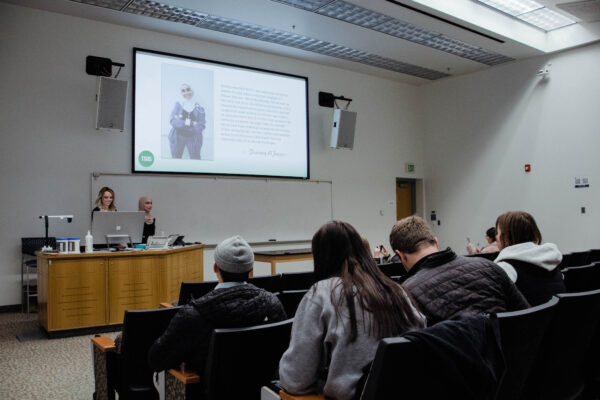‘No them — just us:’ the power of a refugee’s story
Ben Walters voice wavered, stemming from an iPhone’s tiny speaker, but the devotion in his tone could be heard clearly.
“Everybody has a story,” said Walters, a representative from USU’s chapter of Their Story is Our Story.
Also known as TSOS, the non-profit organization based in Salt Lake City, advocates for refugees through stories.
In fall 2021, Tyler Rich, a sophomore studying finance accounting, decided to start a club representing the organization at USU in the midst of the Taliban offensive.
“I kind of just realized I knew nothing about the refugee situation,” Rich said.
He had been working with TSOS for a couple of months, and he thought it important he and others learn more before more refugees came to Utah.
“I think it was important to know a little bit about their culture and where they’re coming from,” Rich said.
So he got together with a couple of friends, communicated with TSOS, and started the club once he got approval.
“We just started doing whatever we could to help promote more awareness,” Rich said.
The club set up booths and began sharing refugee stories in the hopes of inspiring the next generation of leaders to be sensitive to the experiences of all members of the community.
The organization ensures refugees know they aren’t being taken advantage of by giving them the option to share anonymously or share however much they want.
Rich believes giving refugees the opportunity to share and put their stories into words is powerful.
“We hope that they just feel empowered,” Rich said, “that they can then go and be like OK, ‘Now people know what I’ve been through I can do this.’”
Rich tried putting his story into words a while ago to see what it was like on the other side of the collection process.
“It was cool because it helped me to kind of realize who I am,” Rich said.

After the collection process, TSOS uses the stories to educate people about refugees’ journeys and experiences.
“There’s a lot of power in a narrative,” Walters said.
Rich hopes these stories help people understand the similarities between themselves and refugees.
“They’re real people,” Rich said, “They’re part of our communities.”
TSOS collects refugees’ stories from all over Utah and the world through a meticulous interview process.
It’s important to be sensitive when contacting refugees. Cultural differences can make it easy to offend individuals. In addition, sometimes sharing one’s story can lead to consequences or put a refugee family in danger.
“We have to be very careful,” Rich said.
Rich hopes these stories help break stereotypes. Oftentimes, there’s a narrative of poverty about refugees.
However, that’s not always the case. There are refugee doctors and refugee lawyers and refugee managers.
One of the organization’s mottos is “there is no them — just us.” TSOS strives to break down the “us vs. them” mentality and bridge the gap between all members of the community.
During one of the club’s events earlier this year, it had Miss Utah, whose campaign is based on refugees, as well as another speaker, come and give a presentation.
Their presentation focused on challenging perspectives of refugees. During the presentation, the speakers talked about issues with certain assumptions or conversational tactics.
“Why are we always jumping to where are you from?” Rich said.
Starting a conversation with “where are you from?” builds up a wall, according to Rich. It differentiates and separates, it creates a “them.”
“They’re part of us,” Rich said, “They’re part of our community”
Instead, the presentation taught students to begin with “who are you?” promoting trying to understand who a refugee or minority is as a person.
“Just learn to love,” Rich said. “Love people for who they are and never, never assume anything.”
Stories have the power to empower individuals. Putting experiences into words can help someone feel heard, understood and can aid in self-discovery as seen in Rich’s experience.
But sometimes the real power comes from hearing a story and learning who someone is. It comes from seeing them as similar, as a part of us.
Because everyone has a story.
Photos submitted by Tyler Rich.

